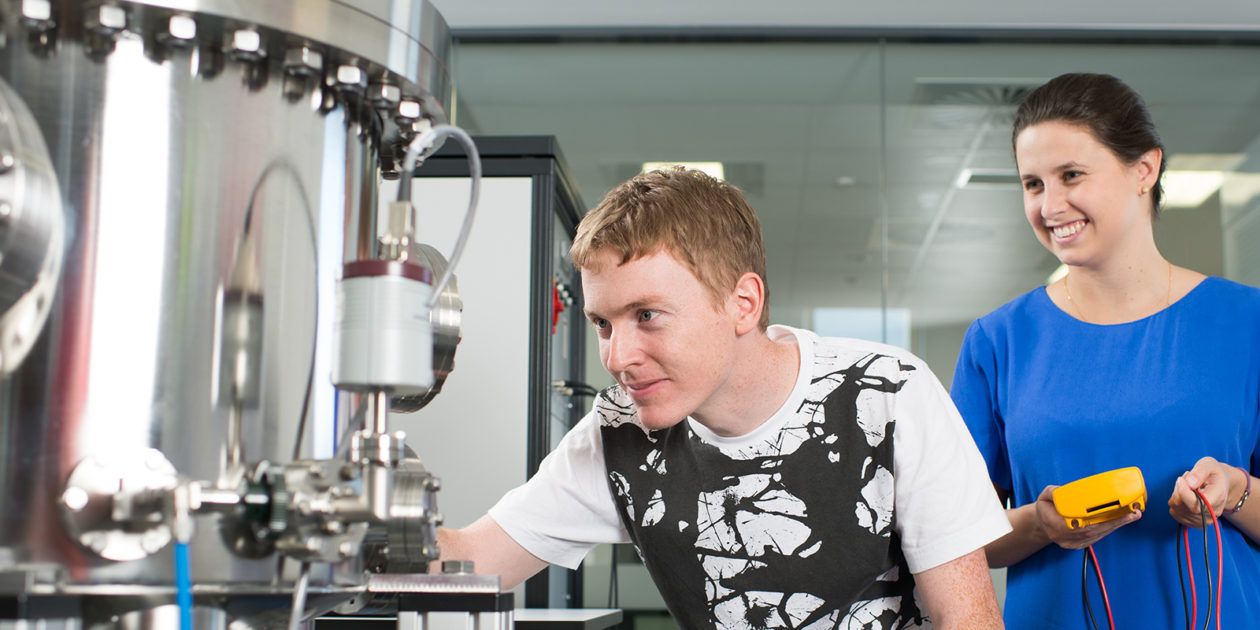Overview
Overview
Physics is the fundamental study of matter and space and their interactions and evolution in time, while engineering is the application of this knowledge to meet human needs in science and technology. This challenging double degree provides a unique combination of a theoretical, quantitative scientific discipline with a practical, highly applied discipline.
You will explore subjects in astronomy, physics, and mathematics, along with data acquisition, analysis and modelling techniques. You'll also undertake a physics research project under the supervision of a research group. Specialist areas of study include radio astronomy, marine science and technology, and satellite and remote sensing.
In your first year you will complete the Engineering Foundation Year (EFY). The EFY builds a solid base of the fundamental concepts common to all areas of engineering. The EFY was developed in partnership with industry to create a curriculum that is reflective of engineering practice.
The final two years are devoted to electrical and communication engineering. You will study analogue and digital communication systems, information processing, telecommunications and computer communication networks, signal and image processing, control and instrumentation, as well as electronic design.
The course will help you develop a full spectrum of skills, from the theoretical, conceptual and problem-solving skills required in the study of physics, right through to project management and real-world applications gained in the study of engineering.
To satisfy professional requirements, students must complete at least 12 weeks or equivalent of exposure to professional engineering practice. This requirement can be met by appropriate work experience or through a combination of technical and non-technical activities. Students must demonstrate that they have met these requirements by using a formal Log Book to record their professional experiences during the period of their degree study.
Please refer to the handbook for additional course overview information.
What jobs can the Electronics and Communication Engineering Honours and Physics Double Degree Major (BEng Hons/BSc) course lead to?
- Electronics Engineer
- Communications Engineer
- Computational Physicist
- Computer programmer
- Data analyst
- Remote Sensing Scientist
- Research Scientist
Graduates enjoy a high level of employment flexibility, as their analytical ability, problem solving skills and logical thinking is broadly applicable at the highest levels of industry or government organisations. With a background in physics and electrical and communication engineering, graduates have a versatility which opens up a wide range of employment opportunities.
- Astronomer
- Meteorologist
- Oceanographer
- Physicist
- Electrical Engineer
What you'll learn
- Major Learning Outcome 1: Please refer to the Course Learning Outcome 1 for the Bachelor of Engineering, Bachelor of Science (BB-ENGSCI)
- Major Learning Outcome 2: Please refer to the Course Learning Outcome 2 for the Bachelor of Engineering, Bachelor of Science (BB-ENGSCI)
- Major Learning Outcome 3: Please refer to the Course Learning Outcome 3 for the Bachelor of Engineering, Bachelor of Science (BB-ENGSCI)
- Major Learning Outcome 4: Please refer to the Course Learning Outcome 4 for the Bachelor of Engineering, Bachelor of Science (BB-ENGSCI)
- Major Learning Outcome 5: Please refer to the Course Learning Outcome 5 for the Bachelor of Engineering, Bachelor of Science (BB-ENGSCI)
- Major Learning Outcome 6: Please refer to the Course Learning Outcome 6 for the Bachelor of Engineering, Bachelor of Science (BB-ENGSCI)
- Major Learning Outcome 7: Please refer to the Course Learning Outcome 7 for the Bachelor of Engineering, Bachelor of Science (BB-ENGSCI)
- Major Learning Outcome 8: Please refer to the Course Learning Outcome 8 for the Bachelor of Engineering, Bachelor of Science (BB-ENGSCI)
- Major Learning Outcome 9: Please refer to the Course Learning Outcome 9 for the Bachelor of Engineering, Bachelor of Science (BB-ENGSCI)
